It’s war: Russian leader Vladimir Putin declares ‘military operation’ in Ukraine
Russian President Vladimir Putin has announced a military operation in Ukraine and warned the world of grave consequences if any country gets in their way.

World
Don't miss out on the headlines from World. Followed categories will be added to My News.
Russian President Vladimir Putin has announced a military operation in Ukraine and vowed retaliation for any country that interfered.
“I have made the decision of a military operation,” Putin said in a surprise statement on television shortly before 6am, local time.
Putin called on Ukraine military to “lay down its arms” and return home, claiming his goal was to demilitarize the country.
He also warned other countries not to interfere with Russia’s military plans. He warned NATO and others that would lead to “consequences they have never seen”.
Putin said in his televised address the action Russia was taking was to defend itself, blaming the Ukraine “regime” for any bloodshed, and denied Russia was intent on occuping Ukraine.
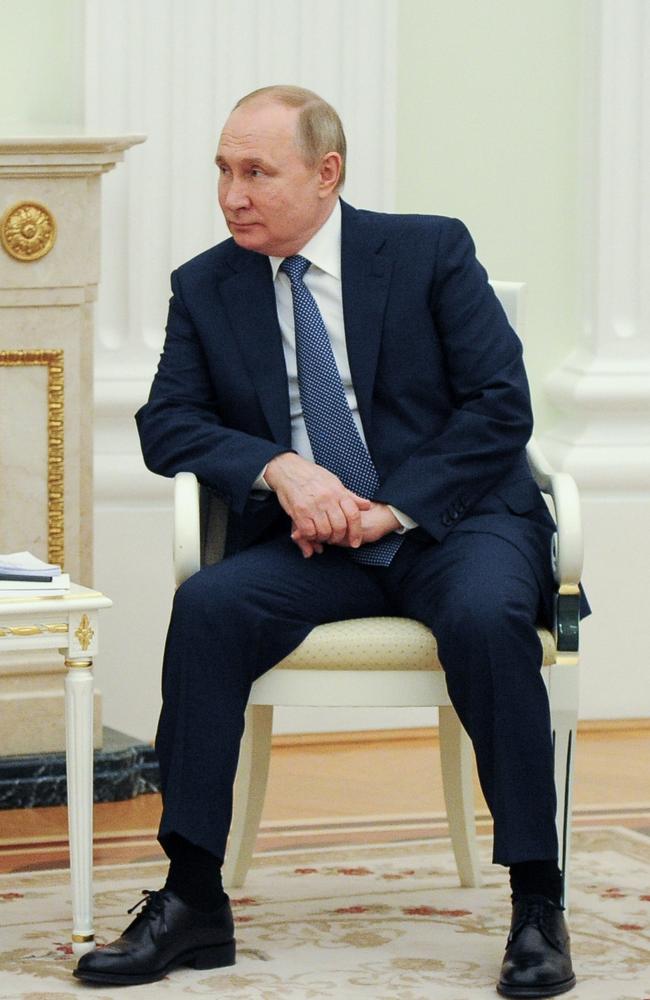
Immediately following the speech sounds of explosions were heard in Kramatorsk, followed by reports of sounds of explosions or artillery firing in Kharkiv, Odessa, Mariupol and capital city Kyiv.
There were also reports of explosions and artillery fire in Kharkiv, Odessa, and Mariupol — all major cities in Ukraine.
NATO chief Jens Stoltenberg denounced Russia’s “reckless and unprovoked attack” on Ukraine, warning it put “countless” lives in jeopardy.
“I strongly condemn Russia’s reckless and unprovoked attack on Ukraine, which puts at risk countless civilian lives. Once again, despite our repeated warnings and tireless efforts to engage in diplomacy, Russia has chosen the path of aggression against a sovereign and independent country,” Stoltenberg said in a statement.
“NATO Allies will meet to address the consequences of Russia’s aggressive actions. We stand with the people of Ukraine at this terrible time. NATO will do all it takes to protect and defend all allies.
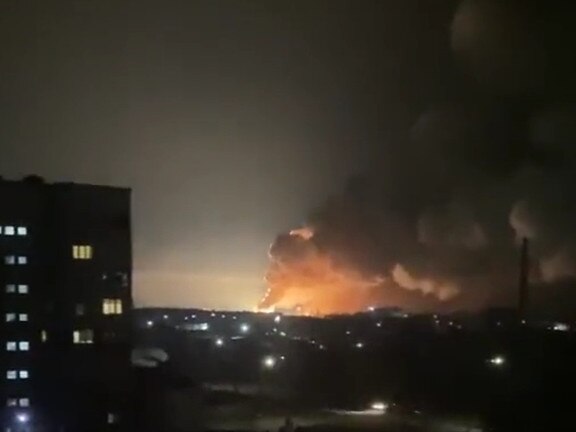
US President Joe Biden said the “world will hold Russia accountable” over its attack against Ukraine that he warned will cause “catastrophic loss of life.”
Biden said he would address the US public Thursday to outline the “consequences” for Russia, calling the attack “unprovoked and unjustified.”
The US president was due to join a virtual, closed-doors meeting of G7 leaders -- Britain, Canada, France, Germany, Italy, Japan and the United States. Thursday.
Earlier, US Secretary of State Anthony Blinken had said he expected a further invasion to come possibly within hours.
“Everything seems to be in place for Russia to engage in a major aggression against Ukraine,” Mr Blinken told NBC News.
“Russia has positioned its forces at the final point of readiness across Ukraine’s borders to the north, ot the east, to the south,” he said.
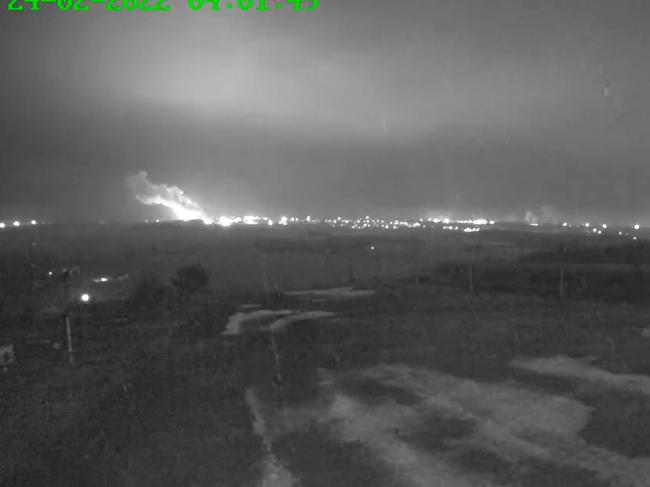
While some observers have urged caution noting that the White House has for some time been warning of an imminent invasion, the comments come as senior Australian sources said that they expect Russia to soon make a move to take much more of Ukraine than the breakaway provinces of Luhansk and Donetsk.
It came as nuclear warheads, including the TOS-1 “Buratino” and TOS-1A “Solntsepek”, were reportedly being moved towards the Ukraine border.
It came as Russia fired back at Australian Prime Minister Scott Morrison after he accused the superpower of “bullying” and announced major action.
Russia’s top diplomat in Canberra said the sanctions imposed on Moscow were “misguided”.
It came after Mr Morrison outlined a number of sanctions on Russia’s key industries, as well as five banks and eight high-ranking individuals.
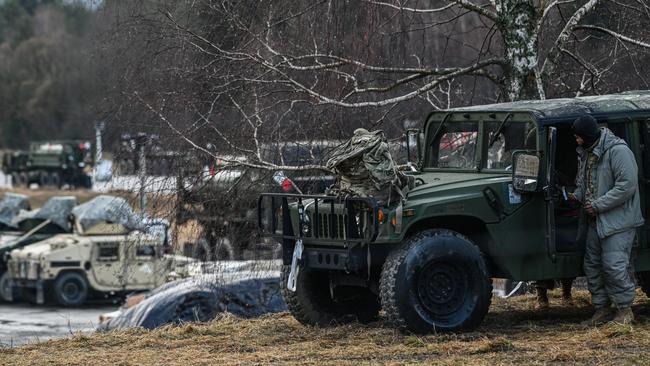
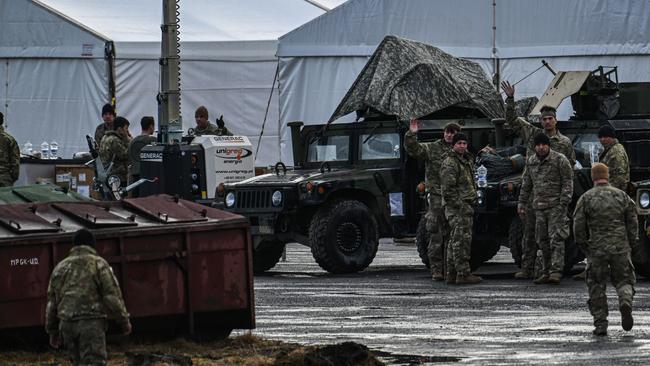
The sanctions were triggered after Russian President Vladimir Putin declared independent recognition of two eastern Ukraine regions – Donetsk and Luhansk.
In announcing the sanctions, Mr Morrison said Australia “always stood up” to “bullies and thugs”, and would not hesitate to impose further sanctions if Russia did not stop their invasion of Ukraine.
Russian Ambassador Alexey Pavlovsky was called into a meeting with the Department of Foreign Affairs and Trade.
In a statement, Mr Pavlovskey said contrary to what Mr Morrison had said, Australia “does not always stand up to bullies”.
“Canberra has been totally indifferent to the discrimination of the Russian speakers by the radical nationalistic regime in Ukraine, and to the plight of civilians in Donbass living for years under blockade and constant shelling form the Ukrainian military,” the statement said.
“In alignment with its key partners, Canberra has played its part in supporting and encouraging the xenophobic bullies based in Kyiv.
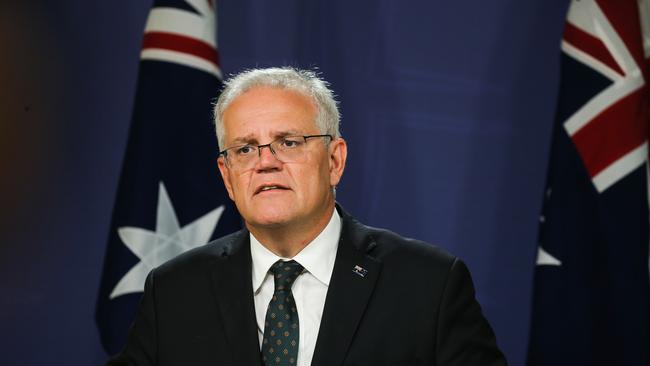
“The decision to recognise DPR and LPR was made on humanitarian grounds, to protect civilians … from the threat to their lives and safety posed by the current Ukraine regime.”
Mr Morrison labelled Russia’s invasion of Ukraine “unjustified, unwarranted, unprovoked and unacceptable”.
Mr Morrison convened an emergency meeting of cabinet’s national security committee.
In lock-step with the United States and the United Kingdom, Australia will place sanctions on five Russian banks named by the United States earlier – Rossiya, IS Bank, General Bank, Promsvyazbank and the Black Sea Bank.
In addition, a number of financial sanctions will be placed on the transport, energy, telecommunications, oil, gas and mineral reserves industries.
Sanctions have been placed on eight individuals, with the Prime Minister warning that could be expanded.
Acknowledging that Australia does not have a significantly close trading relationship with Russia, Mr Morrison said the sanctions would begin “immediately” and would get “stronger and stronger” down the line.
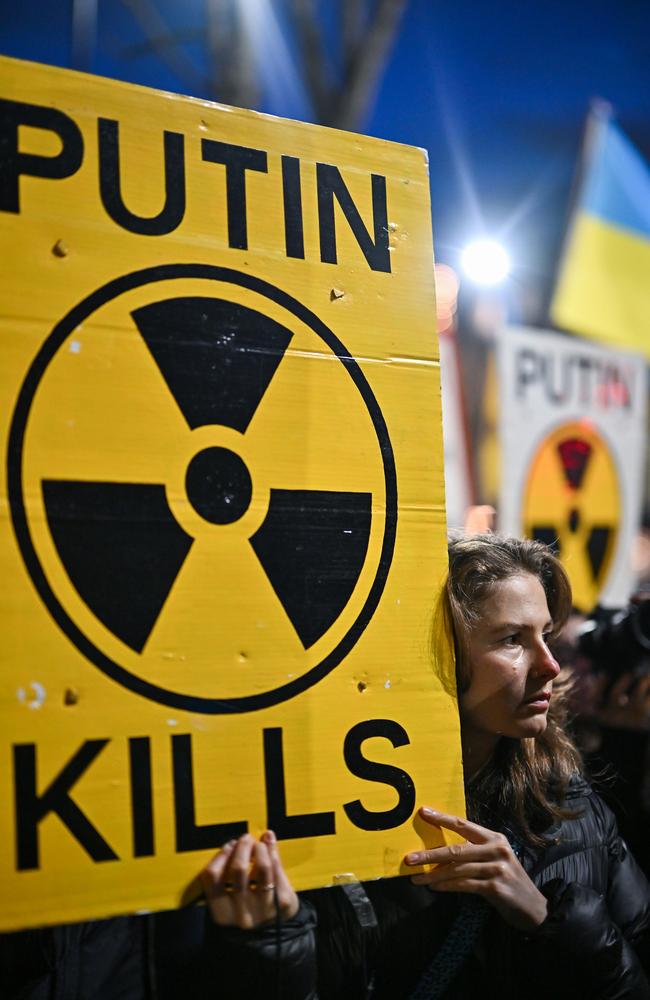
“And we will be standing up to Russia, along with all of our partners and all those who believe that it is totally unacceptable that Russia would invade its neighbour,” Mr Morrison said.
“These sanctions will significantly expand the scope of persons, and I stress, entities that Australia can list for targeted financial sanctions and travel bans.
“It’s included to capture persons and entities of what is termed strategic and economic significance to Russia.”
Labor leader Anthony Albanese said the sanctions were “appropriate”.
“What we see with the actions of Russia in militarily intervening across the border into Ukraine isn’t the actions of peacekeepers, it’s the actions of peace breakers,” Mr Albanese said.
“What we see with ongoing intimidation against the people of Ukraine is aggressive Russian action which undermines security in the region, and indeed the world and that’s why it’s appropriate that Australia has supported sanctions.
“It is absolutely vital that all nations which are democratic and which value the importance of a national sovereignty being respected, take action in support of the people of Ukraine at this time, so Labor supports the announcement that’s been made by the government.”
Australia‘s sanction announcement comes a day after Russian President Vladimir Putin ordered troops into two rebel regions in eastern Ukraine on a “peacekeeping mission”.
US President Joe Biden has described the move as an “invasion” and vowed to impose tough sanctions.

‘STATE OF EMERGENCY’
After weeks calling for its citizens to remain calm, the Ukrainian government introduced a “state of emergency” declaration to restrict movements and deploy troops to critical infrastructure.
The Ukraine parliament also moved toward laws to allow citizens to carry arms for self defence.
Russia’s move to close diplomatic posts, including a consulate in Odessa in southern Ukraine, was an ominous sign of an imminent advance of Russian artillery, which has already crossed the border to Ukraine’s east.
“Predicting what might be the next step of Russia, the separatists or the personal decisions of the Russian president – I cannot say,” Ukraine’s President Volodymyr Zelenskiy said. Ukrainians were also told to leave Russia immediately and come home as their safety could not be guaranteed.
It came as Russian President Putin appeared in a chilling video address where he said Russia’s “interests were not negotiable”.
“The interests of Russia, the security of our citizens are non-negotiable for us,” Putin said.
The video was released after the Kremlin dismissed sanctions imposed by the US as unlikely to have a significant impact.
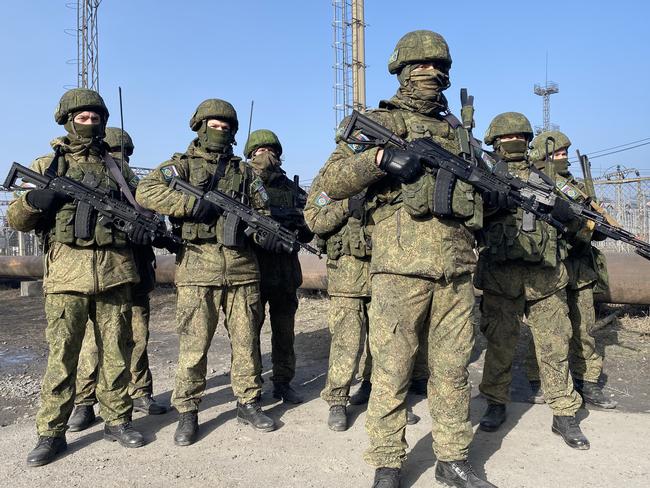
Putin said that Moscow was ready to look for “diplomatic solutions” to the Ukraine crisis, but not at the cost of his country’s interests.
He said Russia was “always open for direct and honest dialogue, for the search for diplomatic solutions to the most complex problems”.
“He has questioned the right to sovereignty of Ukraine and he’s declared that this was a historic mistake, a historic accident that Ukraine is existing,” said Austria’s Innsbruck University professor Gerhard Mangott, of Putin’s address.
“So it’s most likely that his final ambition is to destroy this Ukrainian state, or at least make Ukraine divide into two separate halves.”
UKRAINE INVASION ‘WITHIN HOURS’
A full scale invasion of Ukraine is expected within hours after a tumultuous 24 hours in which Russia mobilised its tanks and artillery into east Ukraine and Western nations including Australia hit back with unprecedented sanctions, travel bans and restrictions.
Ukraine will begin conscripting reservists aged 18 to 60 years, ordering them to immediately report and defend their cities in the face of the evolving Russian threat.
The Ukrainian military recorded 96 incidents of shelling in the Luhansk region in the past 24 hours, knocking out a power plant and killing two troops.
Russian banks, billionaire oligarchs and 350 Russian politicians who voted in support of invading east Ukraine were hit with sanctions as images show tanks and artillery rattling across the Ukraine border into the disputed eastern region.
The US led Western allies including from the EU and Australia in pushing the button on a range of targeted sanctions, but held back some of the more severe financial options, saying diplomatic talks were still an option to avert all out war.
Putin has also suggested matters could be solved by negotiation.
Putin’s address came after the West declared the beginning of Russia’s invasion of east Ukraine, with footage of a convoy of tanks and troops moving into disputed territories.
There was immediate exchange in a volley of missiles between Ukraine forces and those in Donetsk, with two Ukrainian troops killed.
Satellite images in the past 24-hours also showed several new troop and equipment deployments, including the erection of a large field hospital in western Russia and more than 100 vehicles at a small airfield in southern Belarus, just 250km from Ukraine capital Kyiv.
Mr Putin raised the stake further too, recognising independence of additional swathes of Ukraine territory, extending and including the strategic Azov Sea port city of Mariupol.

The moves have set up one of the biggest crisis in Europe since World War II.
US President Joe Biden announced the Russian “invasion” had now begun as he revealed the first tranche of sanctions aimed to starve the country of Western financing.
“To put it simply Russia, just announced that it is carving out a big chunk of Ukraine – this is the beginning of a Russian invasion,” Mr Biden said in a brief address from the White House.
US sanctions included restricting money movements were imposed on key Russian defence servicing banks VEB and Promsvyazbank, but the latter sneered at the move, declaring they would have minimal effect on operations.
The US administration also restricted dealings with Russia’s sovereign debt for bonds issued after March 1.
The White House also repositioned 800 US infantry soldiers, 32 Apache attack helicopters and eight F-35 fighter jets to the Baltic region and Poland to “deter” any Russian aggression against other nations.
Germany, Russia’s biggest buyer of gas, suspended the new Nord Stream 2 pipeline project development while the UK placed sanctions on five banks – named as the Black Sea Bank, Genbank, IS Bank, Promsvyazbank and Bank Rossiya – which has close ties to the Kremlin and had already been under US sanctions since 2014.

The UK also announced three Russian oligarchs close to the Kremlin and Vladimir Putin himself would be barred from entry to the UK and British businesses would be banned from doing business with them.
The Russian troop movements prompted the immediate cancelling of a last bid summit to avert a greater crisis, between US Secretary of State Antony Blinken and French foreign Minister Jean-Yves Le Drian with Russian counterpart Sergei Lavrov.
Mr Lavrov dismissed the significance of the sanctions.
“There’s no question that Russia is the aggressor, so we’re clear eyed about the challenges we’re facing,” Mr Biden said. “Nonetheless, there is still time to avert the worst-case scenario that will bring untold suffering to millions of people.”
Ukrainian President Volodymyr Zelenskiy yesterday introduced conscription of reservists but stopped short of a general mobilisation.
“We must increase the readiness of the Ukrainian army for all possible changes in the operational situation,” he said.

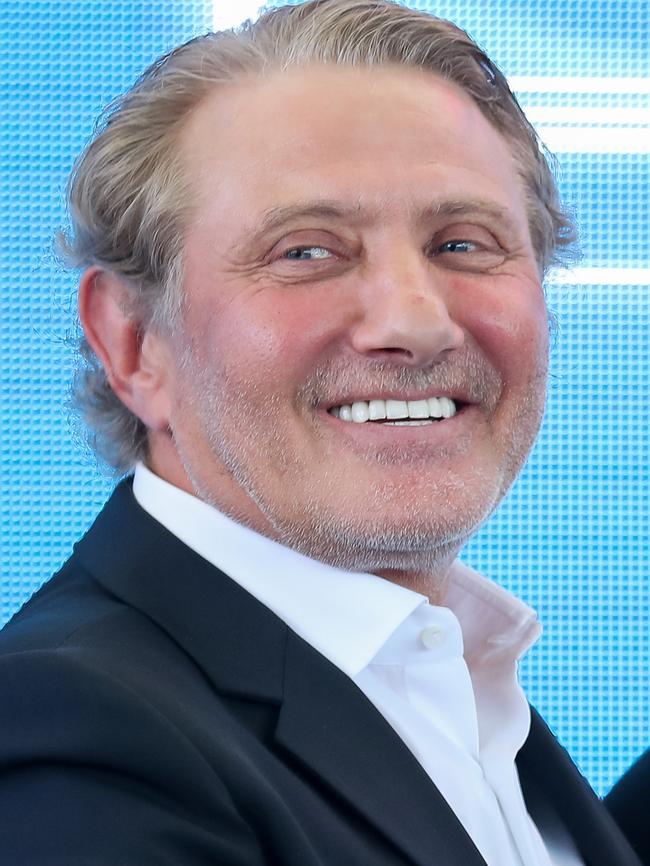
OLIGARCHS FROZEN OUT
Three billionaire oligarchs close to Mr Putin and the Kremlin have been hit with sanctions aimed at their lavish lifestyles.
Gennady Timchenko, Boris Rotenberg and his nephew Igor will be barred from entering the UK and all British individuals and entities will be banned from dealing with them.
The have been on the US sanction hit list since Russia annexed the Ukrainian Crimea in 2014.
The trio were seen as being of “strategic significance” but are only part of a longer list for sanctions to be rolled out in coming days.
The 69-year-old Timchenko, worth more than $38 billion, is a founder of Gunvor, one of the world’s largest commodity trading companies, linked to Putin and involving oil and gas.
He is an ice hockey fan who has played with Putin and is chairman of the Russian national hockey league KHL and vice president of the Russian Olympic Committee.
He also allegedly funds Putin’s lifestyle, including gifting him his seaside palace.
The Rotenbergs, 65-year old Boris and nephew Igor, 48, are from a family that is considered very close to Putin, including running his judo club, which became rich after Putin tasked it with building the Sochi Olympic infrastructure.
The EU also placed sanctions on the 351 Russian politicians who voted to recognise east Ukraine as independent republics, as well as 27 other Russian individuals and institutions.

AUSSIES IN UKRAINE STAND FIRM
Hundreds of Australians have remained in Ukraine, vowing to back their adopted country in the face of Russia’s invasion.
When the Department of Foreign Affairs and Trade changed its travel advisory for Ukraine earlier this month to urge citizens to leave the country, there were 1400 Australians registered as living or on an extended visit to the country.
According to DFAT and a registry set up for expats, at least half – described as permanent or semipermanent residents, dual citizens and others with longstanding familial ties – remained.
“Obviously they are in fear, they always believed something like this might happen but at the same time life goes on and like all Ukrainians they say, ‘We’ve been through this for eight years, always waiting for some sort of attack but we want to stay and we want to help’,” Australian Federation of Ukrainian Organisations president Stefan Romaniw said.
He denounced Russia’s actions and said he was buoyed by Australia’s support.
Speaking as Russian forces mobilised, Mr Romaniw questioned whether diplomacy with Putin could ever have worked.
“The situation was never good,” he said. “In diplomacy there is usually discussion and you come to a decision and sometimes it’s a win-win situation, unfortunately with the Russians and Putin there is never a win-win it’s a ‘we win’, in other words he wins and you lose and that’s that.
“Unfortunately Putin has already had us by the short and curlies and ultimately he is holding everyone in the world at bay, with economies suffering, people’s prices are going up, like petrol ….”
Originally published as It’s war: Russian leader Vladimir Putin declares ‘military operation’ in Ukraine




